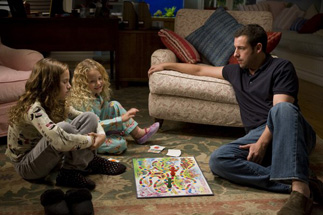|
|
Movie Review: Funny PeopleBy Matthew HuntleyAugust 10, 2009
Even though the movie stars all of Apatow's comedy regulars, including his real-life wife, Leslie Mann, the screenplay is more somber and dramatic than it is comedic. The movie is called Funny People because the characters use humor to make a living, but they're not always funny around each other. Comedy is an art and business to them, one that is often hard and unsatisfying, and we get an insightful look at the world of stand-up and acting. Apatow doesn't parody Hollywood as much as provide an insider's perspective. I have a feeling many people trying to make it in show business will find this movie truthful and relatable, although it might not be as easy for everyone else. Despite the similarities between their characters and real-life personas, I was impressed by Sandler and Rogen's performances. Usually these guys are so goofy and desperate for attention, but they actually act here and play against type (which is ironic, since they're playing actor-comedians). Rogen especially captures the nuances of an innocent twentysomething trying to stay true to his principles in the face of the larger-than-life George, who more or less does what he pleases because of his fame and fortune. His celebrity has given him an inflated ego, burgeoned even more by his endless supply of fans and women. How George handles his newfound mortality and the effect it has on his life is where Apatow's screenplay defies our expectations. In a more conventional story, we might expect George and Ira to become close friends or for George to give Ira his big break. But the script is more thoughtful and realistic. It sees George and Ira as outsiders to each other's worlds, which generates further tension and conflict between them. After George receives good news about his health, he seems less happy and Ira is the only one willing to stand up to him about his pathetic outlook on life. Where the movie steers wrong is during its third act, which lingers far too long on whether George will rekindle his past romance with Laura (Mann). It also introduces Laura's husband, Clarke (Eric Bana), who vies for Laura's love. This entire section felt tacked on and sort of directionless. Once again, I think Apatow is too in love with his own dialogue and situations. He's made a 145-minute film that could have been 120, but he feels the need to include everything that's on his mind. Do the Laura-Clarke scenes really even serve a purpose in this story? They seem like they belonged in another screenplay. Mann and Bana are fine actors, but I'm not convinced their characters were essential. Funny People is good for its intelligent and layered characters, and it has an honest insight into the world of young adults dealing with life-changing issues, but another run through the editing process would have made it tighter and more focused. I still want Apatow to write and direct his own movies, but for his next project, I think he should try his hand at foreign material and go outside his comfort zone. He's shown he can nail the "what he knows" stories, but now that he's been so successful, it's time to see what else he's got.
|

|
|
|

|
Thursday, October 31, 2024
© 2024 Box Office Prophets, a division of One Of Us, Inc.


